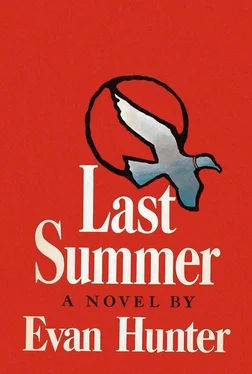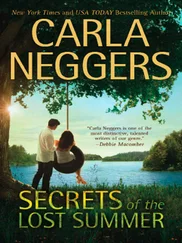A rock rested on the ground some three feet from his body. It was covered with his drying blood. We looked at the gull, and we looked at the rock that had been used to crush his skull, and a slow comprehension came to us, but without horror. It was as though, expecting the worst from this place, we were now unafraid of anything less than the worst. And then, I don’t know why, we were both suddenly overcome with rage.
“You dumb bird!” David said, and picked up the blood-stained rock. I had moved simultaneously, and of my own volition, to pick up the nearest weapon at hand, a rock larger than the one David wielded. We threw the rocks as though on signal, and then we gathered more rocks, hurling them at the bird in rising frenzy, rock after rock, finally exhausting the supply at our feet and, sobbing now, seized fallen limbs which we used to club and batter and pound until the bird lay pulverized, a sodden mass of feathers and gristle and pulp.
We stood over him in tears, exhausted. Our hands and our clothes were covered with blood.
As we walked out of the forest, it occurred to me that we had never even given the stupid gull a name.
Sandy’s mother gave a huge cocktail party on the last Sunday in July.
The alleged purpose of the party was to bid farewell to those islanders who had rented for only half the summer, but Sandy’s mother was a person who seized upon any excuse for a party, and probably would have thrown one anyway, if just to herald the coming of the regatta the following Wednesday.
David and I were at the party, which started at three P.M., only because Sandy’s mother had come to the island without help, and Sandy had offered our services free of charge for the afternoon. Her mother didn’t relish the idea at first, primarily because she had read about Greenwich, Connecticut, kids getting drunk at adult parties and causing automobile accidents and scandals, but we assured her we would participate only as waiters, refilling empty glasses, serving hors d’ouevres , and generally helping to ease the flow of traffic in and around the house. Since she had invited sixty-four people (certain disaster if it rained), and since her staff, before our generous offer, was to consist only of Mr. Caudell (the Pine Street lawyer) and her daughter, she eventually came around to seeing things our way, provided we “didn’t get underfoot.”
The day was sunny and clear.
Mr. Caudell had arrived on Friday night to spend the weekend. Sandy’s mother, with commendable propriety, always put up a cot for him in the living room, though it was Sandy’s observation that the bedclothes never seemed rumpled in the morning and many a floorboard squeaked at night in the passageway between the living room and her mother’s bedroom. He greeted David and me on the rear deck, where he had set up his bar. He was wearing a sports shirt with a loud Hawaiian print, over which he had put on a red bar apron decorated with the legend “Don’t Kiss Me, I’m Cooking.” Neither David nor I understood the apron’s connection with Mr. Caudell’s bartending duties, but we made no comment.
“It’s a gorgeous day, isn’t it?” Mr. Caudell said.
“Wonderful,” David said. “Is there anything we can do before the guests arrive?”
“Just relax, plenty to do later on,” Mr. Caudell said. “I’m certainly glad I’m not on the beach today. I turn lobster red in the sun.”
Sandy came out of the house just then and said, “Oh, hi, I didn’t hear you.”
“Hi,” I said.
“Hi,” David said.
She was wearing big golden hoop earrings and a blue shift. Even barefoot, she was taller than Mr. Caudell, who came up to about her left ear. David and I were wearing clean chinos, sneakers, and our blue Mr. Porter shirts. The three of us looked very good.
“Whatever happened to that bird you were training?” Mr. Caudell asked.
“His head hit a rock and he was killed,” Sandy answered immediately, and then glanced at us. The glance was significant.
Last Monday night, after we’d discovered the dead gull in the forest, David and I had first gone home to wash and change our clothes. (David’s mother, of course, asked him where he had got all that blood on him. After the incident with the beer, she was convinced that her son was a psychopathic criminal, and I’m sure she assumed he had murdered some innocent old man on the dock. He told her we’d been fishing and had cleaned our catch afterward, hence the blood and gore. She bought it.) We had then gone over to Sandy’s house and asked her to take a walk with us on the beach. Huddled over a small wood fire David built in the sand, we told her it was our understanding that there were to be no secrets between us. (Yes, she said, that’s right, that’s certainly true.) Well, we said, not only had she kept a secret, but she had actually lied to us. (No, Sandy said, how can you even think such a thing?) We can think such a thing, we said, because she had told us the bird had slipped his leash and flown away, when it was plainly apparent to both of us that she had led him into the forest and bashed in his skull.
The wood fire crackled and sputtered into the long silence. The waves pounded in against the shore.
“Why did you kill him?” David asked.
“I don’t know,” Sandy said.
“You must know,” I insisted.
“He was a stupid bird,” she said, and suddenly burst into tears. I watched her twisted face in the light of the fire, remembering our own anger, our own bitter tears after we had pounded the gull beyond recognition.
“I’ll never lie to you again,” Sandy said, and that, after all, was the most important thing about the entire incident, this strengthening of the bond between us.
Her glance now was secretive and assuring. She was answering Mr. Caudell’s question honestly, lying to him of course, but once again affirming our unity.
“That’s a shame,” Mr. Caudell said. “Point of fact, he was a most intelligent bird.”
I was spared answering him by the timely arrival of The Dynamiters, an island rock-and-roll group hired for the party by Sandy’s mother. The leader of the group was a kid named Dexter, whom everyone called Deuce, and who resembled a large sheepdog with glasses. He played lead guitar and sang. The rhythm guitarist was a kid who tried to hide his acne by keeping his head ducked at all times. His name was Phil, and he was a very bad musician who sang backup in a high whiny nasal voice. A kid named Arthur, whose father was a doctor, played bass guitar, and the drummer (the only good musician in the bunch) was a year-round islander whose family owned the plumbing supply store over near Mr. Porter’s. His name was Danny. The Dynamiters were all about thirteen, short and somewhat scrawny-looking, and they arrived with four thousand dollars worth of electronic equipment, including amplifiers and microphones enough to broadcast a signal to Tokyo. Deuce, the leader of the group, shy in the presence of anyone, but especially girls, approached Sandy deferentially and said, “Excuse me, Miss, but where did you want us to set up?”
“I’ll ask my mother,” Sandy said, and went inside.
“Well, so you fellows are the band, huh?” Mr. Caudell observed brilliantly,
“Yessir,” Deuce answered.
“What do you call yourselves?”
“The Dynamiters.”
“I hope you don’t have short fuses,” Mr. Caudell said, and winked at David and me, and then burst out laughing.
“Nossir,” Deuce answered, not getting the joke.
“What instrument do you play, son?” Mr. Caudell asked.
“Lead guitar, sir,” Deuce said.
“Would you care for a soda or something?”
“Not right now, sir, thank you,” Deuce said, and then smiled at me timidly and said, “Hi, Peter.”
Читать дальше


![Маргарет Миллар - Rose's Last Summer [= The Lively Corpse]](/books/384369/margaret-millar-rose-s-last-summer-the-lively-c-thumb.webp)









